BARNSTABLE – What gives life meaning? That question was in sharp focus for Cape Codder Kara Howard during her recent stint in the Peace Corps, living for two and a half years in a tiny village in Lesotho, a mountainous kingdom surrounded by South Africa.
“I really feel I see and experience the world in a different way,” said Kara, who is 24 and a 2009 graduate of Chatham High School. “I was given so much by my community in Lesotho. I really learned what it means to be invested in a community. Our life in America moves so fast, you miss out on moments that constitute our humanity.”
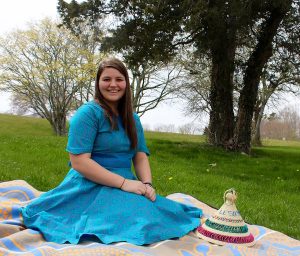
Kara Howard is back home on Cape Cod after serving for two-and-a-half years in the Peace Corps in Lesotho. She wears a traditional dress given to her by her Lesotho family.
Being away for more than two years, she missed the wedding of a friend and other moments big and small in her life at home in the United States, but she was absorbed into a new world. “The things you learn are what is truly important. It’s a stripped down version and you realize what you really value more than anything. Everyone deserves an experience like that. Now that I’ve come back, I’m even more driven to pursue a career that I have a passion for,” she said.
That passion is for education. In August, Kara will begin a masters program in international education policy at Harvard University. While she does not know if she will end up living on Cape Cod, she knows that growing up in a small town on Cape Cod made her better able to connect with life in a tiny village in Africa.
“The idea of a community where everybody cares about each other is very special. I feel very lucky,” she said of growing up in Chatham and staying in touch with teachers and coaches from Chatham High School.
Kara was led to the Peace Corps through her studies. After graduating from Chatham High School, Kara attended college American University in Washington DC. In 2013, she graduated from American, earning a bachelor’s degree in international development with minors in education and economics.
It was in her senior year at American University that Kara began to consider joining the Peace Corps.
“I realized that if I wanted to study development, I needed to see it in practice,” she said.
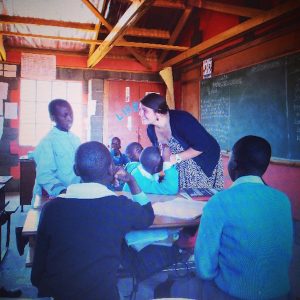
COURTESY KARA HOWARD
Kara Howard, who grew up in Chatham on Cape Cod, teaching her fifth grade class during her stint serving in the Peace Corps in Lesotho.
She applied to the Peace Corps in January of 2013 and was informed of her placement that June. She left in October 2013.
Kara said when she found out that she had been assigned to Lesotho, “I was actually really excited.” She was already familiar with the region, because, during her junior year in college in 2012, she had studied abroad for a semester in South Africa in a program in which she taught in a township school.
“I caught the teaching bug. I fell in love with the environment I was teaching in and the impact on my students propelled me to apply to the teaching program in the Peace Corps,” she said. “Unlike most people, I knew where Lesotho was.”
That excitement was replaced with what she called “a paralyzing fear” when it hit her that she would be moving to Africa for two and a half years. But once she arrived, that fear quickly vanished.
“The second I got there, I felt totally at home and secure,” she said, citing the Peace Corps staff and the people of Lesotho with providing that feeling. “The people were so amazingly welcoming, it was hard to feel homesick at all.”
The lay of the land in Lesotho is about as far from Cape Cod as you can get. “It’s the opposite of Cape Cod. No oceans, all mountains,” Kara said.
Most of the inhabitants of the country live in extreme poverty, earning well below the international poverty level of $2 a day.
Kara lived with a Lesotho family in which the father was the chief of a tiny village that consisted of 107 families. The man and his wife had four children, including three young ones of 6, 4 and one-and-a-half, who had never before seen a Caucasian person. The culture shock went both ways. Kara said the children were wide-eyed to see her, for example, attempting to make pancakes for the family, a dish they had not had before. But, she said with pride, within a few months, they were looking forward to her Sunday pancake meals. “It was quite an experience for them,” Kara said of the young ones in the family.
Kara explained that Lesotho is a kingdom where the ruler owns all the land and residents of the kingdom are, in effect, borrowing the land where they live and the fields where they work from the king. The village chief divides up the land to the village’s families. Within the individual villages, the village chief also arbitrates conflicts, from property issues having to do with livestock to domestic issues.
With no electricity, the sun controls the length of the work day, so in summer, the day, which for most adults involves work in the fields, starts around 4:30am and ends at 8pm when the sun sets. In winter, the sun rises at about 7am and sets at 5pm. Unlike some other parts of Africa, Lesotho has four full seasons, Kara said, including a cold and snowy winter. Kara said she can attest, “it is very cold in a thatched roof hut in winter.”
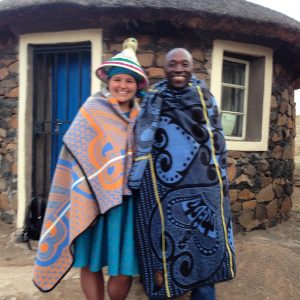
COURTESY KARA HOWARD
Wearing traditional dress, Kara Howard poses with her Lesotho “father” who is also the chief of the village, during her stint in the Peace Corps.
In addition to no electricity, there was also no running water or indoor plumbing. But reliance of those modern conveniences quickly faded for Kara. “There was lots to get adjusted to, but after a few months, I didn’t notice,” she said.
She remembers the first time she had to haul water to wash her clothes. For the first few months, she tried to avoid doing laundry, but after a time, she said, the chore became routine.
One difference she never quite got used to, though, was not being able to leave the house at night. Customarily, women simply did not leave the house alone at night. “That was culturally the way it was. I had to keep reminding myself,” she said.
For food, Kara said, the people of Lesotho subsist on “a staple food,” called papa, a boiled corn meal with the consistency of hard grits. It is used as a base in every meal, breakfast, lunch and dinner. They serve it with collard greens or with beans. About three times a year, they might slaughter a goat or a sheep to celebrate a special occasion.
Kara said she is not a picky eater and quickly got used to the traditional food. The big adjustment, she said, was the absence of seafood, a staple for a Cape Codder.
As different as Lesotho is from Cape Cod, Kara said she was able to see many similarities. For instance, Kara was surprised at how similar the Lesotho people are to Americans. “Kids were still kids. Teens were teens,” she said.
Of the children, she said, “The toys might be different, but it’s the playing that’s shared.”
As for adults, concerns seem to be the same. “Whether you have a lot of money or a little money, you are always concerned about money and providing for your family. The husband and wife squabble like married couples in the states.”
“I found a sense of fulfillment. Every day in Lesotho, I was fulfilled in every moment. . . . I could see myself growing and learning every day.” Kara Howard, Peace Corps volunteer.
Kara said she saw that special moments with family are not unlike moments here. “The heart of who people are is really similar,” she said.
She compared her mother here in the states with her Lesotho “mother”. “My mother in Lesotho worried about what I was cooking for dinner the same way my mother did when I was in college,” she said. Seeing those similarities had value, Kara said. “It’s really beneficial for a young American to see. We focus so much on differences and we lose sight of what makes humans humans,” she said.
While in Lesotho, Kara taught English to fourth to seventh grade students in a primary school that had 150 students in pre-kindergarten to seventh grade.
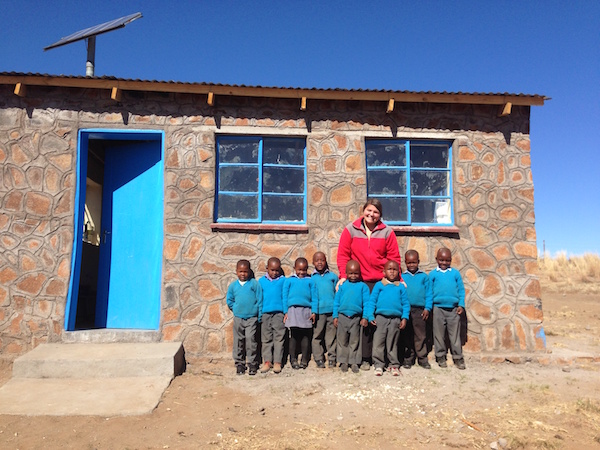
COURTESY KARA HOWARD
Peace Corps volunteer Kara Howard stands with her pre-school class in front of the school they helped to build through a grant they submitted.
The people of Lesotho speak the Sesotho language. Kara learned enough of the local language to communicate with her Lesotho family and to teach workshops in self-sufficiency.
In Lesotho, primary education undergoes a big switch in the fourth grade. Until that time, classes are taught in the native language, Sotho. Beginning in fourth grade, everything is taught in English.
Kara said that language switch is challenging for the students. “My fourth graders knew five or six sentences of English,” she said. She spent time working with her Lesotho teaching colleagues on strategies for teaching English, including promoting the idea of speaking it at home and in the playground in order to help them in class.
For most Lesotho children, formal education ends after the seventh grade. There are regional high schools, but transportation is an issue and there are also fees that are beyond the means of most families. In the village where Kara lived, children needed to walk four hours to get to the nearest regional high school.
Besides teaching English at the local school, Kara ran boys and girls youth groups. She focused on HIV and AIDS awareness, since Lesotho has the second highest per capita incidence of HIV and AIDS infection in the world; 25 percent of the population has HIV or AIDS.
“Lesotho is suffering from the lost middle generation. In most villages, there are young children and old grandparents. The parents have died. Many grandmothers are looking after young children,” Kara said.
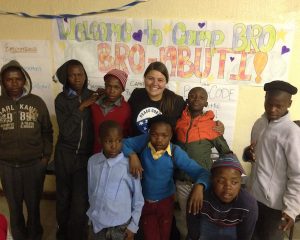
COURTESY KARA HOWARD
Kara Howard with the boys youth group she led at a Peace Corps camp called, Boys Respecting Others.
Part of what leads to the high death rate is the challenging access to HIV medications. For people in Kara’s village, the nearest clinic is a four-hour walk away and once there, the patient has to wait in line to get the antiretroviral therapy medicine and hope they haven’t run out of pills. Then they have to walk the four hours back home.
“It is a big commitment and inconvenience,” she said. And for some, the four-hour journey on foot is simply physically impossible. But there is a second issue: shame. “There is a huge stigma on HIV and AIDS,” Kara said. “People don’t want to be tested and known as HIV positive. If they walk to the clinic, that is a public acknowledgment of their HIV status.”
But views about HIV and AIDS are changing in the youth of Lesotho, Kara said. While the disease is still highly stigmatized, what Kara noticed is that the youth she worked with knew family members had died from AIDS and that frightened them. But changing behavior to protect themselves from the disease is also a scary prospect.
A big contributor to the spread of HIV and AIDS is unprotected sex. While Kara was in Lesotho in 2014, the United States changed its stance to allow the distribution of condoms in the developing world. “Before that volunteers were not allowed to hand out condoms. Congress wouldn’t fund anything but abstinence,” she said. The new rules allow condom distribution if a system is set up to continue the distribution into the future.
For Kara’s youth group, they organized a system by which a youth leader would pick up condoms from the clinic and bring them to the village. The other boys can then get the condoms from the youth leaders, which is a less stigmitized system than getting them from a teacher or other adult.
Kara’s upbringing in the small town of Chatham on Cape Cod led her to understand the role stigma can play in a small town. “Going to Chatham High School, everyone knew what happened on Friday or Saturday night. In Lesotho, it is very similar, so finding a way for access [to condoms] without triggering the shame that comes with that is hard,” she said.
Kara’s work on HIV and AIDS prevention seemed particularly effective with the boys youth group. She met twice a week with 30 young men between the ages of 13 and 25. By the end of her sessions with the boys group, 29 of the members had been tested for HIV and had been circumcised, which can decrease the spread of HIV.
The boys were also doing community service projects, inspired by Kara. This was a big change because previously groups of boys hanging out together were seen as a safety issue and a threat in the community.
“It became a real source of pride in the village and was changing the ways boys were viewed in the community,” she said.
Meeting with a group of girls was more challenging, Kara said, because of the society’s customs for girls. The gender roles are stringent and affect all aspects of culture, she said. Even at school, girls are obligated to sweep the floors of the classroom, where boys are given construction work to do at school. Girls are required to be home doing chores when they are not at school, so it was harder to find a time to meet with them outside of school.
Kara ended up meeting with a group of 40 girls at lunchtime at school. Her sessions with the girls, Kara said, were more “conversational and informal” than her sessions with the boys. “I was one of them. Sometimes I spoke and they listened, and sometimes they spoke and I listened. For them, I was an example of a life they haven’t considered: a young woman not married and without children.” Kara said she hopes seeing a different lifestyle was meaningful for the girls.
Kara returned to Cape Cod in December and is now living in the town of Barnstable. In the years since she graduated from Chatham High School, the school has merged with Harwich High School and is now Monomoy High School. Kara has gone to Monomoy to talk to students about her experience in the Peace Corps. “I really cherish those moments to give back to a community that gave me so much,” she said.
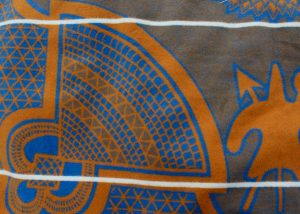
Villagers in Lesotho gave Kara Howard a handmade blanket decorated with symbols of their village. The symbol above left is an image of the traditional straw hat.
Looking forward, Kara said her goal through her studies at Harvard is to work on international education policy, “to redesign standards for our institutions across the world, particularly a global and local language co-mingling, how we teach to different levels and different strengths.”
What it comes down to is a focus on education, whether in this country or abroad. “My passion and drive to continue to work in this field is pretty steady,” she said.
But she expects her experience in Lesotho will always stay with her. For a photo session with Cape Cod Wave, she was wearing a colorful Lesotho dress that her family gave her. She carried a traditional straw hat and a sheep’s wool blanket decorated with patterns that signify the district where she lived. The villagers got her the blanket as a going away gift.
“It signifies the clan and village of my father, so I’ll always be a part of the Lesotho family,” she said.
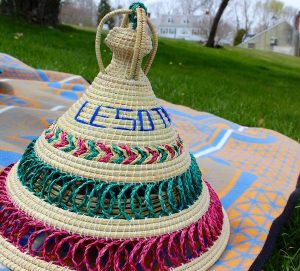
The traditional straw hat of the village in Lesotho where Kara Howard was stationed in the Peace Corps.
As she furthers her studies, she said that the concept of community will always be with her and will serve her well as she studies broader issues. “Cape Cod gave me that,” she said.
When she thinks back on her Peace Corps experience, Kara’s buzzwords are “challenging” and “eye-opening.” What she found in the experience, she said, is a kind of awakening.
“I found a sense of fulfillment. Every day in Lesotho, I was fulfilled in every moment. I felt it was meaningful,” Kara said. “I felt I could see the impact on me. I could see myself growing and learning every day.”
Kara Howard will be at the Peace Corps table at the upcoming Multicultural Festival on May 7, 2016 at Cape Cod Community College in West Barnstable.

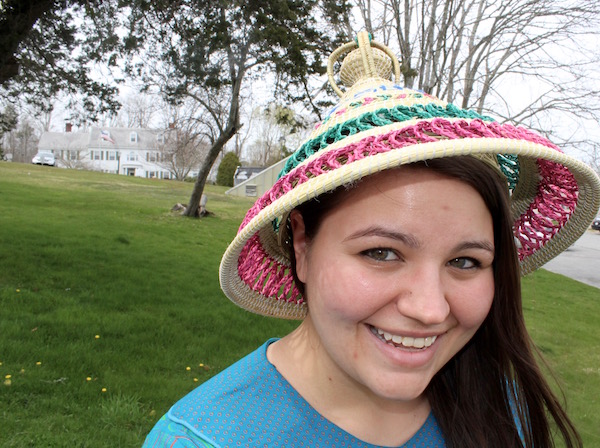
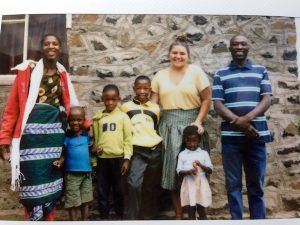
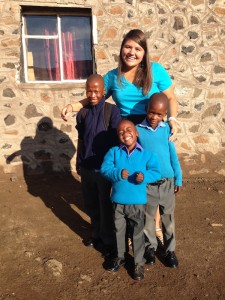


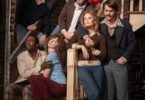

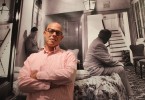

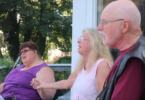
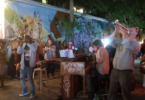


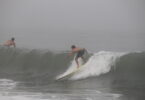

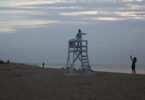



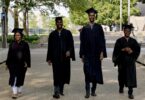

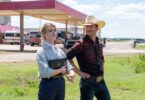



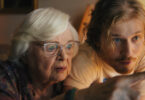


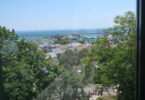


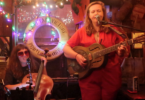

Lesotho is my home am happy to read about these inspiring tales